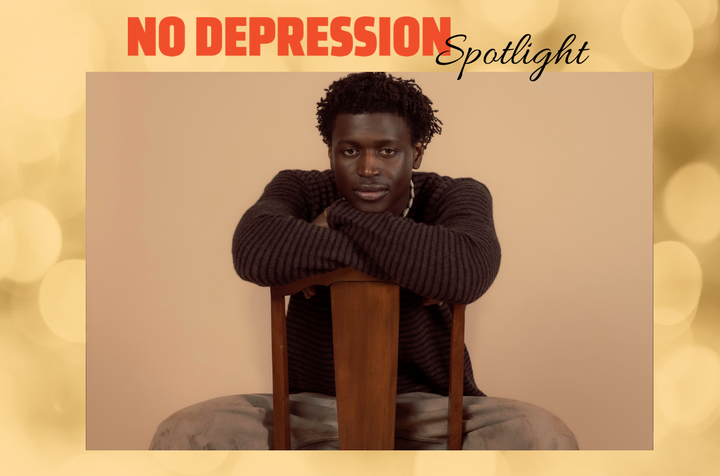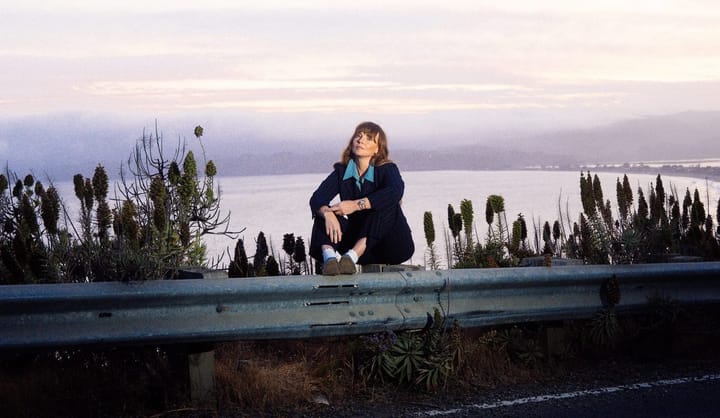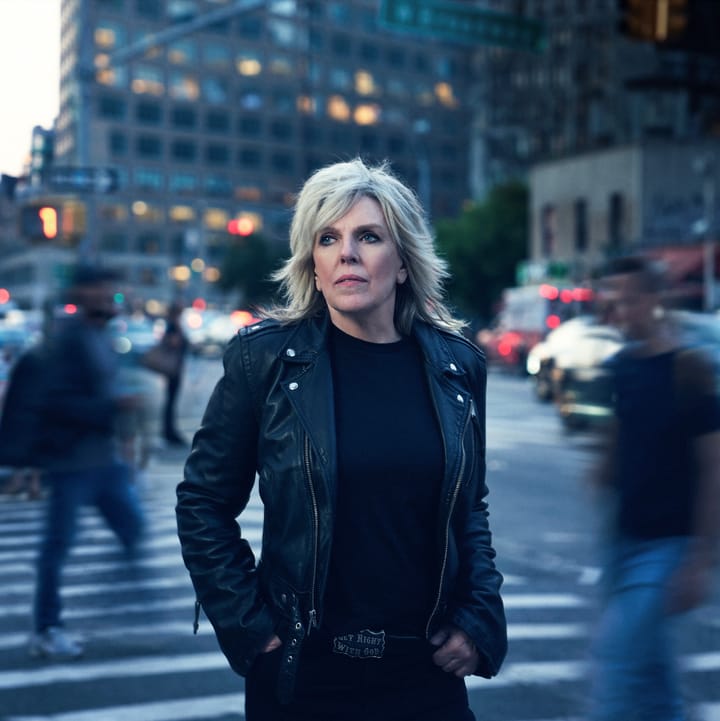Today's breakthrough female singer in country music, Gretchen Wilson, is celebrated and promoted for her up-from-down-home midwest background, for her blunt and direct way of holding herself and singing, and for R&B-influenced rock elements in her music that give way to moving, traditional honky-tonk ballads. In a real sense, Wilson now fills the smart, feisty woman niche left open within Sony's Nashville division when the Dixie Chicks were effectively pressured into a hiatus from that role.
Back in the early '90s, before either of those acts were well-known, Sony Nashville let loose a couple of strong, largely forgotten albums from a fiery, knowing vocalist with every one of the attributes now associated with Wilson -- and who first introduced a couple of the songs ("Tonight The Heartache's On Me" and "Cold Day In July") that would launch Natalie Maines and the Chicks into stardom.
That was Joy Lynn White, best recalled by most readers here, no doubt, for her extraordinary 1997 Pete Anderson-produced alt-country disc The Lucky Few, which posited and presented her as the female answer to Dwight Yoakam. That album went to #1 on the fledgling Gavin Americana chart and featured breathtaking, gulp-inducing versions of Lucinda Williams' "I Just Wanted To See You So Bad" and Jim Lauderdale's "Why Do I Love You?"
Joy spent the second half of '97 opening for Lucinda and playing a variety of other dates. The national audience had no reason to know she was simultaneously fighting to collect money from the record, disappointed with the performance of her manager and booker in the wake of critical raves, and caught up in the sort of enervating differences over directions and choices not so uncommon for a woman in the music business who knows what she wants.
And, as White is the first to admit, she has rarely hesitated, particularly in those days, to speak her mind -- bluntly.
"Honesty can be misinterpreted," she says in a conversation at Nashville's Portland Brew coffeeshop. "Honesty ruffles a lot of feathers. I feel like I've sometimes gotten 'womanized' from that. And I'm a real redhead, too, which, right away, sets off some people thinking, 'Uh-oh!'
"But I stuck to my guns. It's not that I'd been trying to hurt anybody's feelings or piss anybody off, but when this is the truth -- well, sorry, if that bothers you!"
Even as these professional battles flared, in January 1998, Joy's only niece, 14-year-old Jamie Leigh White, was killed, swept away in an East Tennessee flash flood along with other close relatives. It was a devastating loss that she couldn't just set aside.
"After awhile," she recalls ruefully, "you can get so beaten down that you just go, 'I'll quit for a while; I can't take it anymore. And that's what I did. I shut down."
What followed was a hiatus from recording, for more than a passing "while." In the nearly nine years since, save for a 2002 collection of demos of songs she'd written (sold only online and at shows), there had not been another Joy Lynn White release -- until this past October. Titled, appropriately, One More Time, it was co-produced by White with veteran Kyle Lehning for his new label, Thortch, built largely on songs she co-wrote.
Moving easily from sledgehammer roots-rock to '70s-style country-rock tones and spare, understated balladry, One More Time is already being taken for the markedly strong return it is; it had reached the upper ranks of the current Americana airplay charts by the moment of its release. The theme running all through its tracks, in a word, is resilience: Take it all in, spit it back out, bounce back, and come up smiling.
The title song, co-written with Amy Rigby, speaks of breaking the habit of misplaying the cards dealt to you. "I'm Free", co-written with Nashville songwriting great Kostas, turns country music convention on its head: The ex-lover walks by, and Joy Lynn doesn't fall to pieces. And "Victim Of Love" expresses unmitigated joy (no pun intended) in not being one of those.
"Yeah; there you go," she agreed. "'We've got the scars to remind us, so we won't end in tragedy.' That line's in 'Victim Of Love' and it says it all. It's, 'Hey; if you don't really like me, if I don't like you -- I don't want to hurt your feelings, and you don't want to hurt mine. Let's just be friends and go our own way, look somewhere else.'...I want to say 'Don't be a doormat; you can be all right without these guys.'"
Some of the women she's speaking to here are her musical peers, especially those who have been less lucky than she actually has been on the Music City scene. They're saluted on what may be the most striking song on One More Time, "Girls With Apartments In Nashville", co-written with Duane Jarvis, a frequent collaborator and bandmate.
The song "is about the idealism I saw when I first moved here in 1982 -- girls with different intentions, driving beat-up cars who came here to make music, make art," White says. "It was a completely different town; it was always first about being a really good singer, and singing great songs. I came here not wanting to 'be a star' -- but to make records, make a living doing what I wanted to do, to be what I was meant to be. That was my dream.
"I'm not a rich girl, and I didn't come here to go to Belmont College and get a degree to get in the business; didn't even think about doing anything like that. 'Girls With Townhouses Driving Beamers In Nashville' -- that would be the epitome of how it is now!"
Unlike so many aspiring singers, then and now, White didn't have to start out in Nashville by learning the rudiments of performing. She was at it when she was 5, as lead singer with Indiana's "Singing White Family featuring Little Lynn White."
Her dad, Gene White, was a partying cotton picker from West Memphis, Arkansas, in the heart of the Mississippi Delta, raised on Jimmie Rodgers, the Carter Family, gospel and the blues. He played Luther Perkins/Tennessee Two-style guitar, and sang, as did Joy Lynn's mother, who'd come from the hills of far Eastern Tennessee. They all moved to South Bend, Indiana, when Joy was three.
"I was always exposed to music and thought everybody's family was that way," she recalls. "I can never remember my dad not sitting on the couch, playing an electric guitar. When I was ten months old, in Arkansas, I was already speaking complete sentences; by the time I was a year old, I sang every single thing on the car radio 'to the T and on key,' they tell me. People would gather round the car and say, 'How'd you tache her to do thet?' Then we had the group, and I was playing everywhere, every Sunday, and sometimes would be on radio shows up in Michigan."
At about the time some performing kids give up on appearing in public forever, Joy was excited by the sounds of Neil Young, Bonnie Raitt, and especially Linda Ronstadt singing the likes of "Silver Threads And Golden Needles" on the radio. At 17, she would herself be the "girl singer," fronting various garage bands around town, singing maybe a bit more like the records she'd heard than with the distinctive tones she'd become known for -- but already at full tilt and rocking, and occasionally toying with some songwriting of her own.
The outright country music of the Dolly Partons and Loretta Lynns was not what she headed to Nashville for, in 1982, at age 20. She was soon a much-turned-to singer of mainstream country demos, known for passionate and emotionally on-target performances that were getting songs sold. She wouldn't have an album of her own for ten years, consistently told that her problem was that she didn't sound like anybody else. Her first record, Between Midnight & Hindsight (released in 1992 on Columbia), was culled from the variety of polished demos she'd cut.
It may surprise some that she recalls her work on that big-label Music Row debut, and its 1994 follow-up Wild Love, in a generally positive light -- although her dad died suddenly just as the first disc was coming out, and she was, by her own description, none too successful in dealing with that grief while trying to do what was asked of her. No huge singles emerged from those much-praised albums and, amid an inevitable change of regimes, she was dumped in the mid-'90s, along with fellow mavericks Shelby Lynne and Rodney Crowell.
Bob Kirsch of Welk Music, who liked what she'd done in those days, signed her to a publishing deal in 1999, her first move back into the breach after walking away from it all in 1997 (she writes songs under that deal to this day). She sometimes works with Music Row stalwarts who wanted to write with someone less commercially-oriented, sometimes with the East Nashville-style independent types with whom she has continued to perform around town. There haven't been a slew of well-placed songs, but along the way, White accumulated a very workable new selection of self-made material.
She could be seen in her "rarely-seen years" alongside Buddy Miller as an occasional onstage fill-in in for his wife Julie Miller; dueting with Robbie Fulks on the Webb Pierce tribute CD Caught In The Webb; playing around Nashville with Duane Jarvis and Phil Lee; picking up session work singing behind Randy Travis and Sara Evans; popping in for a local Neil Young tribute, alternating leads with Allison Moorer. White's highly justifiable confidence in her live performing never really waned.
"Live is the real thing; ya know what I mean?" she says. "I think it was good that I was doing that, actually getting up onstage, and not caring what Nashville thought about me. I don't have to have a record deal; if you give me a chance, I'll knock 'em dead. I'll step up to the plate every time; I'm an experienced singer."
In Kyle Lehning, celebrated producer of albums by Randy Travis, Tammy Wynette, Waylon Jennings and the Derailers, she found a willing collaborator when the time felt right to go on record again, in search of a result that would be far removed from any sort of cookie-cutter production. The new sessions reportedly went smoothly throughout, and she attained the sort of sound she was after, reminiscent of '70s country-rock production but with nods to the sorts of sounds heard on Lucinda Williams or Iris DeMent records of more recent vintage.
"I didn't want this record to sound like a commercial country record that came out of Nashville," she says. "I wanted players on this record that I had played with in clubs, that had come out and worked with me and I liked the way they played. They weren't people down on Music Row doing demos 9 to 5."
They also worked to avoid the "more raggedy than thou" affectations sometimes associated with alternative-country productions. "I just cannot get on records and not sing in tune -- or make it sound like I'm so tired and worn out because it seems cool to be that way -- like chicken scratch!" she explains. "Anybody who'd build a house or paint a room, they want the lines to be straight. I want my vocals to be in tune, the harmonies to be good. I'm a perfectionist like that with my singing."
White hopes to be touring nationally in support of One More Time, but she feels little pull toward deeper involvement with the Music Row side of her career, other than potential cuts of her songs. She rarely does demo sessions now; she's more likely to be seen working for a cause she's passionate about -- the protection and proper treatment of pets and other animals -- than working to promote herself around the industry.
She still drives one of those apartment girls' beat-up cars, but she's capable, heading into 2006, of calling herself "fortunate and very blessed." No less feisty than before, she can be a lot more careful about what she says and doesn't say. And one thing you won't find on One More Time is a lot of grievance and complaint songs.
"I can't write them anymore," White says, laughing. "I have a million of those. They're all over my house! But I'd rather see women be strong, be proud of themselves, have a happy life. You don't have to have what the norm of society says we have to have. I don't put down people who are in that world, but I'm OK with all of this now. I think...I think I was made to do what I have done in my life."
ND senior editor Barry Mazor is also a freelance writer for the Wall Street Journal and the Nashville Scene, among others.




Comments ()